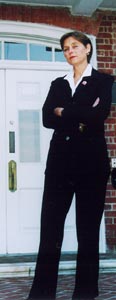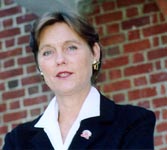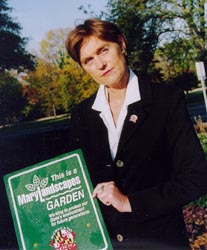 NBT Interview: Louise Hayman
NBT Interview: Louise Hayman NBT Interview: Louise Hayman
NBT Interview: Louise Hayman
Preparing Marylanders For the 21st Century
Some folks are fretting, but Maryland 2000 is betting that the new millennium will be rewarding for us all.
Only 57 days left to Y2K.
The 20th century - and with it the second millennium ce - is sliding into history. Daylight has shrunk to a mere 11 hours. The fall has come, of leaves as well as light. The holiday season is upon us. Like cars on a speeding train, Halloween blurs into Thanksgiving into Christmas and Hanukkah into Kwanzaa into a new millennium.
It's late - but not yet too late.
On the third floor of the Louis L. Goldstein Treasury Building in Annapolis, Maryland 2000 is helping us get ready. No, the people in these offices are not frightening us about loonies on the prowl at midnight or cautioning us to stock up on money, bottled water, ultra-Pasteurized milk and toilet paper.
The staff of Maryland 2000 has been working since March 1998 to make the millennium a year-long celebration that can improve Maryland in lasting ways: with gardens, historic preservation and educational efforts.
Maryland 2000 is a collaboration between the state and local governments, companies, schools and many individuals. In this NBT interview, executive director Louise Hayman talks about what Maryland 2000 is doing - and not doing - as we approach this milestone in history.
Her answers have set us thinking. There's a lot to be said for using the ambivalent year 2000 - does it belong in the 20th or 21st century? - for taking stock of who in the world we are in this state of Maryland, in Chesapeake Country, in our counties and communities and neighborhoods; in our families, our homes, our selves.
Read on. Then we'd like to hear your ideas on ways we can use the year 2000 to lay down deep, healthy roots for the next millennium. What are you doing? What do you think New Bay Times should be doing?
Send your ideas to: Sandra Martin, Editor, NBT, P.O. Box 358, Deale, MD, 20751 * Fax 410/867-0307 * E-mail [email protected].
Q There's a lot of nail-biting out there with the coming of the millennium. In your position, do you hear a lot of these fears and uncertainty?
A Probably no more than anyone does as they go about their business in life. I think we do have an opportunity here to look at the positive end of it. Whatever happens as far as Y2K, it's probably not going to be longer than a few days. What we're doing is a whole year of positive things and beyond.
Q What are Marylanders
thinking about as 2000 approaches? About partying? About what lurks in terms
of breakdown in society? About high-minded projects like yours? 
A I think it's a very personal thing. I think that for many people, it doesn't really mean much of anything. I think for others, it's a soul-searching moment. They're thinking, what about my life? What am I going to do for the next 10, 20, 30, 40, 50 years I may have? I am not sure that people individually are thinking universally. I think it boils down to human nature: You're thinking about what it means to you as an individual, not collectively what it means to civilization.
Q Is there an overemphasis on a moment in time - New Year's Eve?
A It seems somewhat artificial to me that an institution or an individual would put that much emphasis on some arbitrary time period and say 'this is really going to be important in my life and it's going to mean something.' I don't think you can assume it's going to turn out the way you're forcing it. That's why we have a much better chance with what we're going to do.
Q Let's talk about the philosophy that underlies Maryland 2000. What are you trying to do as we approach this benchmark in history?
A I think it's fair to say that the state of Maryland is planning the most comprehensive millennium celebration of any state in the nation. That may be damning with faint praise because other states just haven't jumped on the millennium bandwagon to any degree.
I think that when Gov. [Parris] Glendening was approached on this, the expectation was something celebratory and on the entertainment side. And therefore the Maryland Commission for Celebration 2000 was established. The executive order that established it is very broad. It guides us by saying that we're going to look back at our past and ahead at our future to prepare Marylanders for the 21st century. It says we're going to involve people to the greatest extent possible in this process.
Q So you had this broad blueprint and it's been up to you to put meat on the bones.
A Exactly. And we've gone through a few variations. I was the first staff member to join the commission, in March of '98. At that time, there was very much an interest in doing what I would call celebratory things. New Year's Eve was the focus. What are we going to do for New Year's Eve? There were some other things that were bubbling up to the surface, some education projects and historic preservation and a few other things. But the real topic was what are we going to do New Year's Eve.
But what has happened is that we have made a complete reversal of that. We have gone from a commission focusing on what is going to happen New Year's Eve to a commission focusing on everything that is going to happen during the year 2000 and what we are going to do on or about New Year's Eve.
It's a much more cerebral approach. I am certainly not condemning the celebratory things that are going to happen. But they are going to happen without us.
Q You really were starting from scratch.
A We made this whole thing up. We invented it completely. No one has ever done anything like this before. There was no manual about how to do a millennial celebration on a statewide level.
Q Do you mean there was nothing from the first millennium in 1000?
A We couldn't find it. I think they must have made really bad copies or something and they faded out. (She laughs.)
Q I saw that one of your seminars is called: "Apocalypse 2000: Envisioning the End." You're not feeding the madness out there, are you?
A My guess is that it will be a retrospective about what people have been saying about what could happen. We had someone come in here, a very brilliant man from the Millennium Institute, who said that since 1984, people have been saying these things. That's when this whole millennium thing started, because of George Orwell [in his book 1984]. It didn't happen in 1984, so people started looking at what the next jump-off point is - 2000.
Q You have a background with the Chesapeake Bay Foundation, is that right?
A I've had a million jobs. Ten years in historic preservation. Three years with the Chesapeake Bay Foundation. I had five years with two different corporations; one was a bank and the other was an insurance company. And I had eight years as a press secretary, one at the county level and one in the office of Gov. [William Donald] Schaefer.
Q What is an average day for you?
A It's completely unpredictable. This is an enormous public relations task. Aside from the planning and the fund-raising and the implementing, we are constantly trying to get the word out about what we are doing. So we are constantly on the road. We just went down on the Eastern Shore. We're in demand to speak to groups about what's going on in the millennium. There's an enormous amount of outreach going on.
Q Does fundraising take up a lot of your time?
A It takes a great deal of time, more than I had anticipated. We have raised about $815,000. It's real money. But this is a really ambitious program. There is a lot going on here.
We've gone from this 'hey, what are we going to do New Year's Eve' to 'maybe we won't focus on New Year's Eve' and focus on legacy-oriented projects instead.
So what we're doing are statewide projects in the environment: Marylandscapes; in the arts, we call it Maryland Images; in education, we call that Knowledge on the Edge. We're doing historic preservation, which we called Save Maryland's Treasures; and we're doing a human services project, which we call Food For the Future.
We're also making grants to local communities. And finally, we're endorsing things that others are doing.
Q Tell us a little about
your Marylandscapes. Is there a signature project that sort of sums it up?
A One is the Anne Arundel retarded citizens organization. They are planting a sensory garden. We had applications from 80 different organizations and schools and local governments to plant these gardens. We only had $110,000 to give out. We have been able to make awards to 29 different organizations, some of whom will be planting on more than one site. So we will have 33 gardens as a result.
Each garden is going to carry a sign that tells how it came to be. Someone who's interested in it can call us or look us up on our web site [www.maryland2000.org]. We may not be able to fund them, but we can give them information about planting these kind of gardens and how to find these native plants that we are recommending.
Q Your goal is doing something that endures, is that right?
A The requirement is that they maintain these gardens for 10 years, which is a long time. Our feeling is that if you can get an organization to say, 'yes, we will commit to a 10-year maintenance program,' probably you're home free. We're going to turn over the monitoring of these gardens to the Chesapeake Bay Trust when we're gone.
Q Tell us a little about the historical preservation component of Maryland 2000.
A There was this large-scale program called Save America's Treasures that was a millennium program of the White House. And there was much hoopla about this. The president asked for $150 million for the program and didn't get it. So here's the White House touting this great program, but there's no money behind it.
We thought that we were going to get a couple of million dollars of that. We decided to do Save Maryland's Treasures anyway, and we went to some partners to get the funding. The idea behind it is that it's a historic preservation program for people who have not been involved in historic preservation. We want people to nominate what they think is a treasure that should be saved. We've gotten about 300 nominations.
Q What kinds of nominations are you getting, mainly old buildings?
A There are a lot of buildings but there also are some documents and even some natural objects. Trees, for instance. It's just a huge variety of things. The idea is that someone might be driving by day after day and say 'you know, I think it's sad that that old building is neglected and somebody ought to do something about it.' Every month we call attention to one; we call it our Treasure of the Month program.
Q Tell us about one of the coming Treasures of the Month.
A We're going to do the skipjack fleet. We're trying to find out how many are left in the fleet right now. We have an inventory that was done in 1984, and we haven't been able to find anything that has been done more recently. We're thinking about focusing on the Rosie Parks, which is down at the St. Michael's Maritime Museum as a sample example. But we will be sort of featuring the whole fleet.
Q What do you hope to achieve with Food for the Future?
A What we've done was like putting a meal together: We had the vegetable, the starch, the meat, but we didn't have the human services component.
Both regions of the U.S. Postal Service that cover the state of Maryland have agreed to do door-to-door collection and to allow us to use the 800 post offices in the state as drop-off points. We also brought the Maryland Food Bank into it. They said we'll get all the food pantries and shelters and warehouses involved in the project.
This will take place during one week in March. Of all the projects, this is the one that is focused on one period of time. We hope to collect the most food that has ever been collected with the most volunteers ever in the state of Maryland.
Q And what is Knowledge on the Edge?
A We had quite a few ideas for education projects. The key point is that we have some sort of educational activity for all ages. There's one environmental project. One human service project. But we're doing six or seven under education.
We have a program called Partnership 2000 that we're doing in the elementary schools and also in the middle schools. One element is getting senior citizens to volunteer in the school system. Another is a program to have members of the business community adopt a school in their community and help with whatever that particular school needs, whether it's a physical need like a new playground or a security issue that they want some creative thinking on or perhaps a public relations problem in the community.
There's also a middle school convention for a day-long program in December. For high school students, we have developed our youth commission, which includes one student from every county. The idea is to get the word out in high schools about what is going on during the millennium.
Q We hear you're getting ready to do some polling.
A We're talking with a pollster right now. This gets back to what I was saying about New Year's Eve 1999 being an important moment in time for us but not one where we were elected to pay for the fireworks or do something that is going to go poof.
We thought what might be a nice thing to start the year off is some kind of survey about what our youth think about their future. We sat down two weeks ago and talked to a pollster about it, and we're looking for some money because this kind of thing doesn't come cheap. We'd like to release the results the last week of the year. We'll focus on high school and college-aged young adults.
When we talked the first time, I said I didn't want to just do something after which people just said 'that's interesting; oh yea, we know that.' I want something that some entity out there in Maryland is going to seize on and take action as a result of this poll, not just make a headline one day and then go away.
Q Do you think that when the clock strikes midnight, some people will say the millennium's over?
A No, because I think that the commercial forces among us in the country will find a way to turn the clock back and start ticking up to 2001. I don't think there will be as much hype as when the clock struck 2000. But I think there will be an effort to look toward 2001.
Q By the way, what are you going to do New Year's Eve?
A (She crinkles her nose.)
I'll be around.
| Issue 45 |
Volume VII Number 45
November 11-17, 1999
New Bay Times
| Homepage |
| Back to Archives |